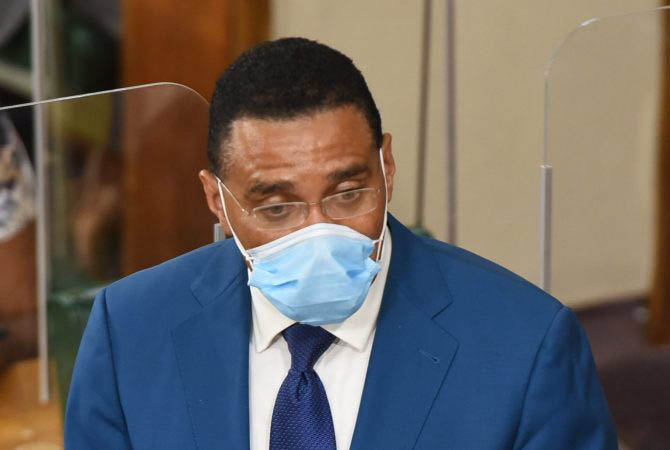Under pressure mostly from the island’s influential private sector, the Jamaica government last week announced that it was discontinuing the weekly ‘no-movement’ days and adjusting its curfew measures even as the erratic behaviour of the seemingly worsening COVID-19 pandemic keeps countries in the region guessing as to how to respond to the mounting numbers of casualties being claimed by the novel coronavirus.
Last week’s announcement by the island’s Prime Minister, Andrew Holness of the removal of the weekly no-movement days and relaxation of curfew measures by one hour came just days after some of the ‘heavy hitters’ in the private sector had made public pronouncements that the no-movement days were seriously disrupting social and economic life while having no discernable positive effect in terms of pushing back the pandemic.
While Holness reportedly told the island’s Parliament that the adjustment in the strictures should not be viewed as a loosening of the overall restraints, observers of the decision noted the coincidence between the concerns publicly expressed by the private sector and the timing of the government’s move.
Other countries in the region, including Guyana, Trinidad and Tobago and Barbados have been seeking to implement measures that place restrictions on business activities, particularly those associated with night-time entertainment. There have been, however, pockets of public pushback against the measures by sections of the respective populations whose social lives are already seriously shackled on account of existing COVID-19 –related measures.
The authorities in both Trinidad and Tobago and Jamaica have also had their challenges associated with the imposition of curfews that target, particularly, after-dark entertainment-related business activities. In Guyana, the pushback against restrictions on night-time entertainment and the attendant curfews persist, against the backdrop of determined pockets of resistance that have seen the intervention of the police and the prosecution of offenders.
Another dimension to the problem here has been the widespread assertion in some quarters that the delinquency manifested in the transgression of night-time restrictions has been due in large measure to a selective official application of curfews that favour privately run entertainment houses that are ‘well-connected’ with the authorities.
While, of late, there appears to have been a greater inclination on the part of the business sector, notably the entertainment sector in Guyana to comply with the curfew and attendant strictures, evidence of pockets of resistance by recalcitrant owners of both high-profile entertainment places and less well-appointed ‘watering holes’ in small communities across the country persist.
Seemingly determined to hold the line on restrictions in the face of evidence that the pandemic could be worsening, the Jamaican Prime Minister told the National Assembly last week that October 18, National Heroes Day, set aside to commemorate the lives and contributions of key figures in the country’s history, will be a “no-movement day.” Holness also said that vaccination sites on the island will be opened on no-movement days.
Back in May and following a meeting between government officials and local undertakers, the authorities agreed to limit the number of persons attending a funeral to fifteen.
Last week Holness disclosed that burials continued to be permitted on Monday to Friday between 9:00 am and 4:00 pm (local time) with a maximum of 15 people. However, burials are not permitted on national holidays.
Public gatherings, the Jamaican Prime Minister said, remain limited to ten persons while the limit for church services remains at twenty. Those numbers also apply for persons attending weddings or annual or extraordinary general meetings.
A Jamaica private sector survey undertaken in August had reportedly pointed to a projected 83 per cent decline in revenues during the lockdown period, which businesses said they were expecting to see, while other members indicated they were unsure of how their revenues would be affected. This, as companies reported, increased challenges in servicing clients on these days, while others had to cancel or reschedule order commitments to customers. Other key data show some 40 per cent of JMEA members reported significant hindrances in obtaining goods from suppliers on these days.
While the business sector in Guyana continues to persist with opening hours for shops, stores and supermarkets which in some instances extend beyond 19:00 hours, recent evidence of a sharp spike in the numbers of COVID-19 cases has triggered a fresh wave of concern that further restraints on trading might be on the cards.






